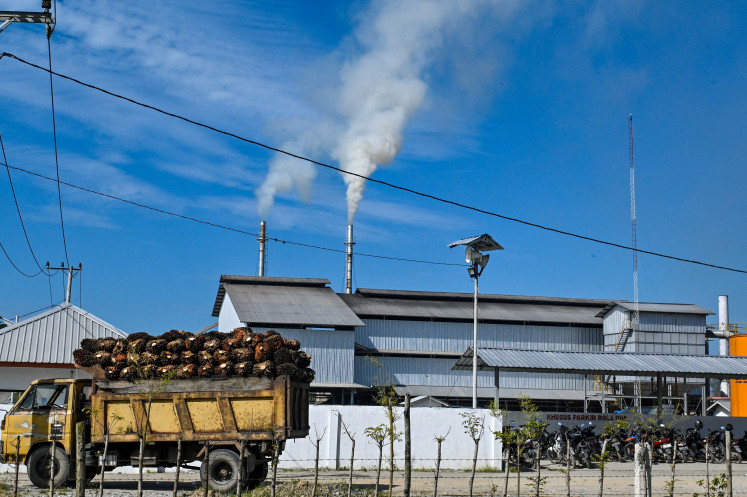Popular Reads
Top Results
Can't find what you're looking for?
View all search resultsPopular Reads
Top Results
Can't find what you're looking for?
View all search resultsGovt now allowed to disband mass groups
Scrutinizing: Coordinating Political, Legal and Security Affairs Minister Wiranto (center), accompanied by Communications and Information Minister Rudiantara (second right), briefs the media in Jakarta on Wednesday about the issuance of a regulation in lieu of law that allows the government to ban any mass organizations
Change text size
Gift Premium Articles
to Anyone
S
span class="caption">Scrutinizing: Coordinating Political, Legal and Security Affairs Minister Wiranto (center), accompanied by Communications and Information Minister Rudiantara (second right), briefs the media in Jakarta on Wednesday about the issuance of a regulation in lieu of law that allows the government to ban any mass organizations.(JP/Dhoni Setiawan)
In a move widely seen as a setback for democracy, President Joko “Jokowi” Widodo has signed a regulation in lieu of law (Perppu) granting his government the power to disband mass organizations without judicial process.
The Perppu, which takes effect immediately, replaces the 2013 Law on Mass Organizations (Ormas) that required the government to seek a court ruling to ban any organizations it deemed opposed the state ideology of Pancailsa and the Constitution.
By skipping the legal process, the government has the absolute power to disband any groups, which activists say is prone to abuse.
The Perppu authorizes the Law and Human Rights Ministry to disband a mass organization within a week after issuing only one warning letter, a sharp contrast to the three reprimands, each valid for up to 30 days, as mandated under the 2013 Ormas.
The Ormas established a prolonged mechanism of at least 270 days before the government could actually disband any organizations considered to be anti-Pancasila or against the 1945 Constitution.
Under the Perppu, mass organizations now have only seven days to respond to a written reprimand from the government. If they fail to comply, the government can immediately suspend their activities. If mass organizations reject the suspension, the ministry could directly revoke their permit to
operate in the country.
Coordinating Political, Legal and Security Affairs Minister Wiranto told reporters at his office on Wednessday that the issuance of the “emergency” policy was intended to defend the country from mass organizations promoting ideologies that were contradictory to Pancasila and the Constitution.
“The Law is no longer able to accommodate swift measures to prevent the spread of ideologies that go against Pancasila and the 1945 Constitution. The institution issuing a permit for mass organizations, therefore, should have power to revoke it. Such an authority is not available under the existing law,” said Wiranto.
The government will expand its definition of anti-Pancasila ideologies, which currently only refers to atheism, Marxism and Lenismism.
The government’s decision to issue the Perppu was triggered mainly by its intention to ban the hard-line Islamic group Hizbut Tahrir Indonesia (HTI), which has campaigned for the establishment of a global caliphate.
The government, however, has been reluctant to file a request to disband HTI with the court.
Amnesty International Indonesia director Usman Hamid said the government was likely aware that it would lose in court as it had announced its plan to disband HTI without complying with requirements set by the law.
“It appears the government wants to create a shortcut by taking away the judiciary’s authority and establishing the ministry as the sole authority to make the disbandment decision. This smells of authoritarianism and threatens not only mass organizations but also non-governmental organizations,” Usman said.
Currently, a total of 344,039 mass organizations operate in the country, which are subject to prosecution under the Perppu should they violate the Constitution or conduct activities seen to oppose Pancasila. The Perppu, however, does not provide any definition of anti-Pancasila or anti-Constitution activities.
“It’d take too long if we had to make a new law, that is why the Perppu was issued. What if lets say, around 100 of the 344,039 mass organizations oppose Pancasila? How would we respond to them without a legal mechanism to justify swift and firm measures?” Wiranto said.
The Perppu annuls a total of 18 Articles, from Articles 63 to 80, from the 2013 law, which regulate that the government adopt a persuasive approach before suspending a mass organization. Under those Articles, the government must issue three reprimands and consult with the Supreme Court before suspending an organization. To revoke a permit of a mass organization, the organization must be given a chance to challenge the verdict at the Supreme Court.
Imparsial executive director Al Araf said there was no emergency situation that required Jokowi to issue the Perppu, adding that the new stipulations in the Perppu clearly threaten democracy and human rights in Indonesia.
“A mass organizations must have the chance to defend itself in a public hearing at court. Respect for the due process of law is fundamental to preventing authoritarianism against mass organizations,” he said.










